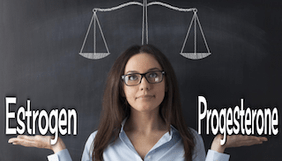Understanding the glands that regulate your hormones
The complex orchestration of hormones, affecting every cell of a woman’s body begins with the master regulator, the hypothalamus. In turn the pituitary, ovaries, adrenals and thyroid glands work in unison ensuring the delicate balance of hormones is maintained. This delicate balance can easily become overwhelmed without proper support, especially during stressful periods of life.25
 1. The hypothalamus at the base of the brain monitors bodily hormone levels and secretes various hormones which in turn stimulate the pituitary gland. 25
1. The hypothalamus at the base of the brain monitors bodily hormone levels and secretes various hormones which in turn stimulate the pituitary gland. 25
2. The pituitary gland just below the hypothalamus, secretes follicle stimulating hormone (FSH) and luteinising hormone (LH) which act on the ovaries, adrenocorticotropic hormone (ACTH) which acts on the adrenal glands and thyroid stimulating hormone (TSH) which acts on the thyroid gland. Also released from the pituitary is prolactin which influences many tissues throughout the body.27
3. The ovaries then secrete the steroid hormones oestrogen and progesterone, regulating fertility and the menstrual cycle among many other functions. The interplay of hormones in the hypothalamic-pituitary-ovarian [HPO] axis is regulated by a feedback mechanism.28
4. Two small adrenal glands sit above the kidneys and release stress hormones such as cortisol, epinephrine and norepinephrine as well as DHEA and androgens. The hypothalamic-pituitary-adrenal axis (HPA) is also regulated by a feedback mechanism.29
5. The thyroid gland regulates temperature and metabolic processes and is also regulated by a feedback mechanism.30
How stress affects your hormones
Stress is well known to impact the reproductive system and contribute to dysfunction.31 High cortisol causes suppression of FSH and LH, leading to disruption of normal menstrual cycle function and lower progesterone.32 Women with adrenal fatigue may also experience low progesterone, because their body makes cortisol in preference to progesterone as a compensatory mechanism.
Prolonged exposure to stress can lead to complete impairment of reproductive function.33 There are both nutrients and herbs that are beneficial in addressing elevated stress and altered reproductive function.15,16 These should always be prescribed by a qualified naturopath following a comprehensive health assessment.
The above research is courtesy of BioPractica.
References:
- Chandrasekhar, K., J. Kapoor, and S. Anishetty, A prospective, randomized double-blind, placebo-controlled study of safety and efficacy of a high-concentration full-spectrum extract of ashwagandha root in reducing stress and anxiety in adults. Indian J Psychol Med, 2012. 34(3): p. 255-62.
- Cropley, M., Banks, A.P. and Boyle, J. The effects of Rhodiola rosea L. extract on anxiety, stress, cognition and other mood symptoms. Phytother Res, 2015. 29 (12): 1934-9.
- Andrade, C., Aswath, A., Chaturvedi, S.K., Sprinivasa, M. and Raguram, R. A double-blind, placebo-controlled evaluation of the anxiolytic efficacy of an ehtanolic extract of withania somnifera. Indian Journal of Psychiatry, 2000. 42 (3): 295-301.
- Jatwa, R. & Kar, A. Amelioration of metaformin-induced hypothyroidism by Withania somnifera and Bauhinia purpurea extracts in Type 2 diabetic mice. Phytother Res, 2009. 23 (8): 1140-5.
- Umeda, F., Kato, K., Muta, K. and Ibayashi, H. Effect of vitamin E on function of pituitary-gonadal axis in male rats and human subjects. Endocrinol Jpn, 1982. 29 (3): 287-92.
- Fathizadeh, N., Ebrahimi, E,Valiani, M.,Tavakoli, N.and Manizhe Hojat Yar. Evaluating the effect of magnesium and magnesium plus vitamin B6 supplement on the severity of premenstrual syndrome. Iran J Nurs Midwifery Res, 2010. 15 (1):401-405.
- N.R., Nutritional Influence on Estrogen Metabolism. Applied Nutritional Science Reports, 2001. 1(1): p. 1-8.
- Ascorbic acid stimulates gonadotropin release by autocrine action by means of NO. Proc Natl Acad Sci U S A, 98 (20): 11783-8.
- Djurasevic, S., Cvijic, G. and Djordjevic, J. et al. The effect of ascorbate supplementation on the activity of antioxidative enzymes in the rat hypothalamus and adrenals. Gen Phyiol Biophys, 2009. 28: 47-52
- Luck, M.R. Jeyaseelan, I. and Scholes, R.A. Ascorbic acid and fertility. Bio Reprod, 1995. 52 (2): 262-6.
- van Die, M.D., Burger, H.G., Teede, H.J. and Bone, K.M. Vitex agnus-castus extracts for female reproductive disorders: a systematic review of clinical trials. Planta Med, 79 (7): 562-75.

